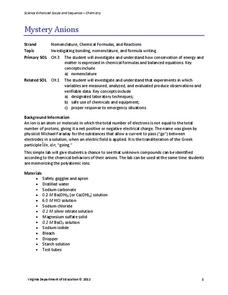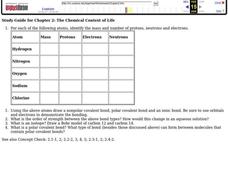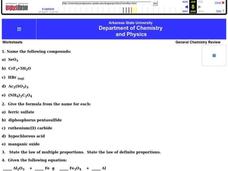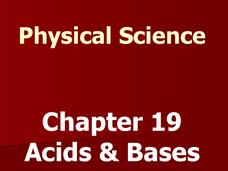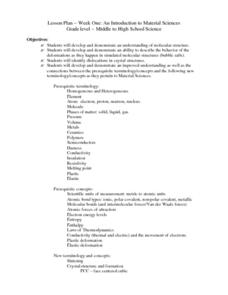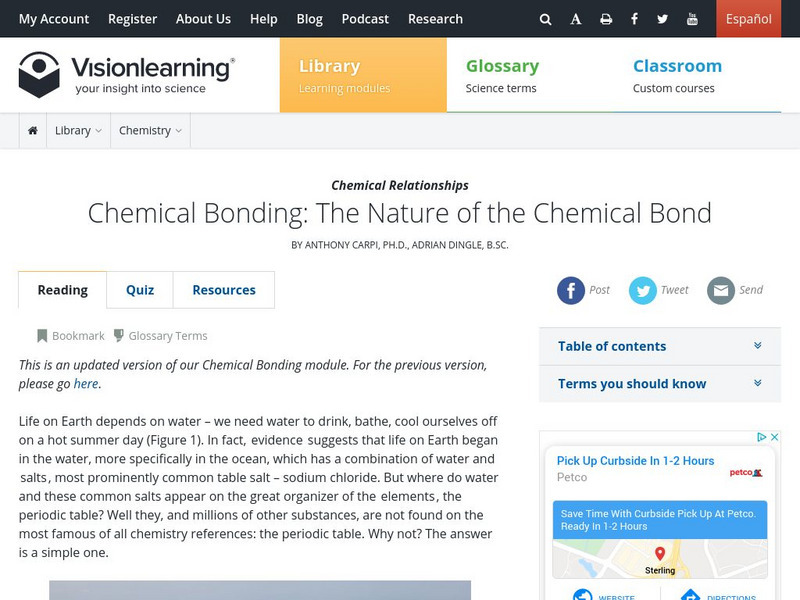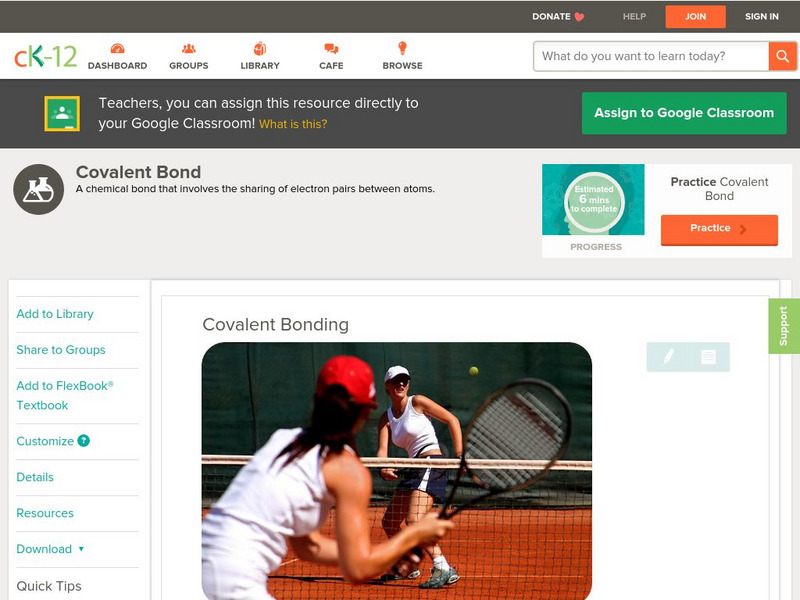Curated OER
Proteins
As long as you have some support information to answer questions that may come up from students, this is an excellent PowerPoint to cover almost all aspects of protein structure and ionization. The sequence of slides has great images and...
American Chemical Society
Temperature Changes in Dissolving
Alia-Seltzer tablets cause a very obvious chemical change, but do they also cause a temperature change? Each class member explores hot/cold packs, discussing how these temperature changes occur. Groups then design and carry out their own...
Curated OER
Water - the (Nearly) Universal Solvent
In this solvent worksheet, students explore why water is considered a universal solvent. Students explore what can change dissolving rates. This worksheet has 8 matching, 3 short answer, 11 fill in the blank, and 4 problems to solve.
Virginia Department of Education
Mystery Anions
Lost an electron? You should keep an ion them. Young chemists learn qualitative analysis in the second activity of an 11-part chemistry series. After observing reactions of simple salts, the teacher provides pupils with unknown samples...
Curated OER
Combining Atoms
In this atoms worksheet, students explore the different types of bonds, name compounds, and determine charges of molecules. This worksheet has 8 true or false, 9 fill in the blank, and 5 short answer questions.
Curated OER
The Chemical Context of Life
In this chemistry worksheet, young scholars fill in the chart for question one. The chart is filled out examining the mass, protons, electrons, and neutrons for specific atoms.
Curated OER
Chemistry of Carbon
After giving basic details about the properties of carbon, some of the common functional groups and molecules are featured. There is some information about specific functions and impact on the human body. The diagrams are helpful and...
Curated OER
Proteins
Vocabulary that is essential to this topic is introduced and defined at the start of this slide show. The following slides help students understand proteins and their use and involvement in everyday substances. Great diagrams help your...
Alabama Learning Exchange
Float or Sink?
Experiment with mass and density as scholars figure out what makes things float or sink. First, they watch a podcast introducing these concepts. Be sure to use the comprehension question to test their understanding. Young scientists...
Curated OER
Chemistry of Carbon: Building Blocks of Life
After giving basic details about the properties of Carbon, some of the common functional groups and molecules are featured. There are some details about specific functions and impact on the human body. The diagrams are helpful and could...
Curated OER
Unit 7 Acid and Base
A series of 25 multiple choice questions is presented to chemistry learners to review properties of acids and bases. A page of notes precedes the questions and contains information about the Arrhenius and Bronsted-Lowry definitions,...
Curated OER
Characteristics of Crystals
In this crystals worksheet, students complete a graphic organizer by filling in the characteristics of the different crystal types including melting/boiling point and electrical conductivity.
Curated OER
Chemistry
In this chemistry worksheet, students describe an atom, its parts, the charges of these parts, and atoms life functions. Then they explain what the octet rule states for the placements of electrons around the nucleus of an atom. Students...
Curated OER
Physical and Chemical Properties of Water
High schoolers experiment with water as a component of suspensions, solutions, and heat conduction contributing to the use of food and the health and wellness of human beings.
Curated OER
Chemical Compounds
In this chemical compounds learning exercise, students write the name of compounds from their chemical formula, balance equations, write electronic configurations for elements, and draw Lewis dot structures. This learning exercise has 8...
Curated OER
Intermolecular Forces
In this intermolecular forces worksheet, students read about the two types of forces: dispersion forces and dipole-dipole forces. Students then complete 2 problems based on what they read.
Mr. E. Science
Acids, Bases and Solutions
If you are not part of the solution, then you are part of the precipitate. The presentation covers solutions, suspensions, solubility, dissociation, and acid/base reactions. This is the 19th lesson in a series of 26.
Curated OER
An Introduction To Material Sciences
Students investigate the concept of molecular structure. They describe the behavior of simulated molecules and identify any dislocations in crystalline structures. They also define various related vocabulary words and use them in...
Khan Academy
Khan Academy: Single and Multiple Covalent Bonds
Explains what covalent bonds are and the difference between them and ionic bonds. Discusses the properties of polar and non-polar covalent bonds, and single and multiple covalent bonds, and gives analogies and examples of how covalent...
Vision Learning
Visionlearning: Chemistry: The Nature of the Chemical Bond
This site talks about ionic, polar covalent, and non-polar covalent bonding.
PBS
Pbs Learning Media: Covalent Bonding
This interactive activity from ChemThink takes a closer look at a covalent bond: how it is formed and how the sharing of two electrons can keep atoms together.
Concord Consortium
Concord Consortium: Stem Resources: Chemical Bonds
By working through this web-based activity, students differentiate between ionic, non-polar covalent, and polar covalent bonds. Specifically, distinctions are made between bonding types based on orbital shapes and electronegativity...
Khan Academy
Khan Academy: Test Prep: Mcat: Chemical Processes: Covalent Bonds: Intramolecular and Intermolecular Forces
Explains what intramolecular and intermolecular forces are and the different types for each. Includes lots of examples.
CK-12 Foundation
Ck 12: Chemistry: Covalent Bonding
A learning module giving the definition of a covalent bond, the compounds and elements they make up and why they form. Module includes reading and review questions.





